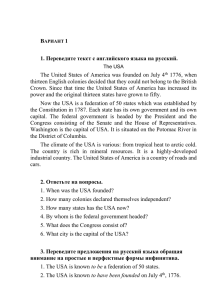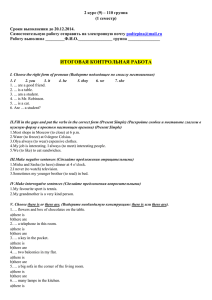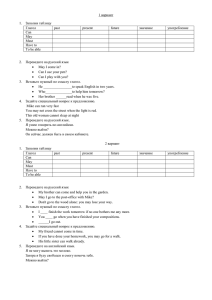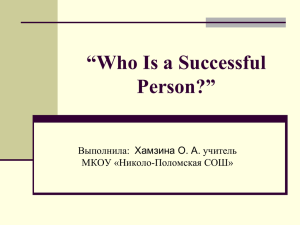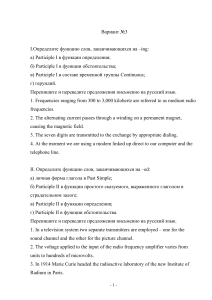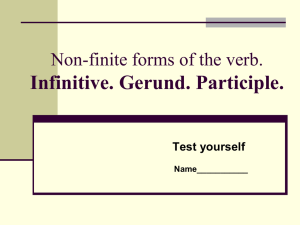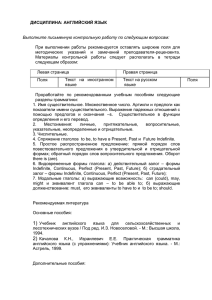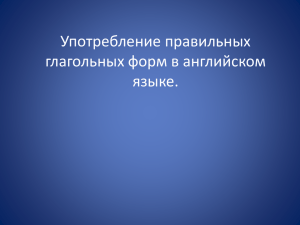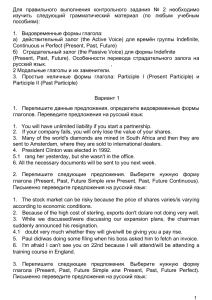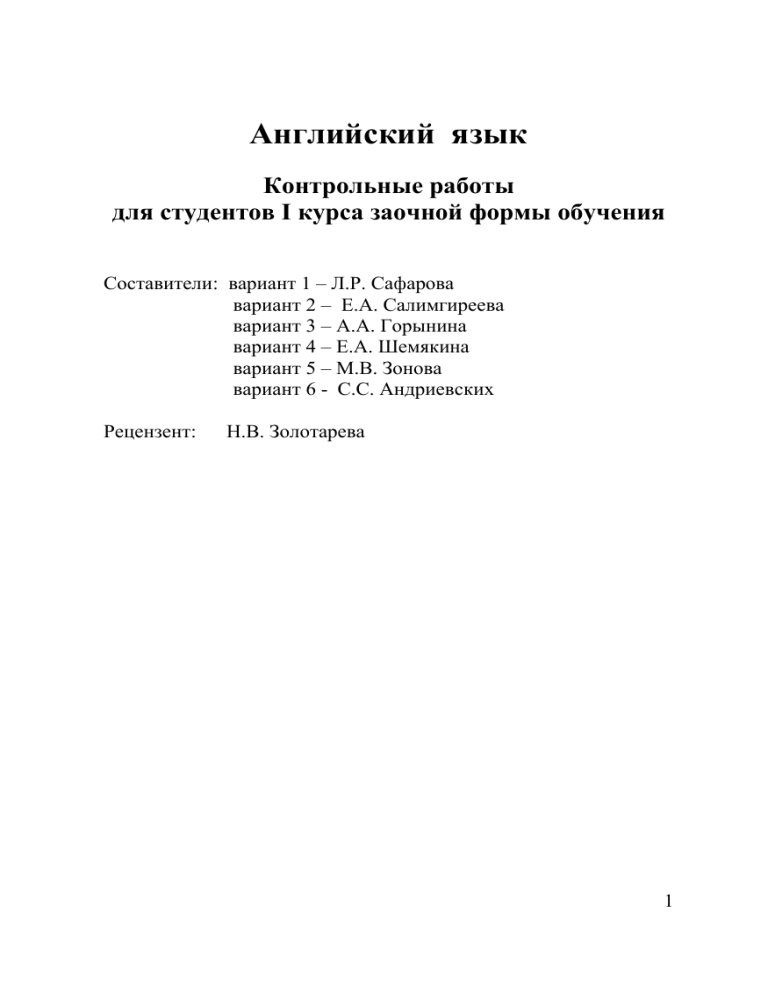
Английский язык Контрольные работы для студентов I курса заочной формы обучения Составители: вариант 1 – Л.Р. Сафарова вариант 2 – Е.А. Салимгиреева вариант 3 – А.А. Горынина вариант 4 – Е.А. Шемякина вариант 5 – М.В. Зонова вариант 6 - С.С. Андриевских Рецензент: Н.В. Золотарева 1 МЕТОДИЧЕСКИЕ УКАЗАНИЯ Контрольные работы относятся к обязательным точкам, предусмотренным программой по иностранному языку для экономических вузов. Основной грамматический материал английского языка распределен по контрольным работам равномерно по мере нарастания сложности. Контрольные работы выполняются письменно и при положительной их оценке защищаются устно во время сессии. На первом курсе выполняются контрольные работы №1 и 2, на втором - №3 и 4. Требования к выполнению контрольной работы 1. Контрольная работа выполняются не менее чем за месяц до сессии. 2. Контрольная работа предлагается в шести вариантах. Вы должны выполнить один из шести вариантов в соответствии с первой буквой вашей фамилии: студенты, чья фамилия начинается с буквы А, Б, В, Г выполняют вариант 1, с букв Д, Е, Ж, З, И – вариант 2, с букв К, Л, М, Н – вариант 3, с букв О, П, Р, С – вариант 4, с букв Т, У, Ф, Х, Ц – вариант 5, с букв Ч, Ш, Щ, Э, Ю, Я – вариант 6. 3. Выполнять контрольную работу следует в отдельной тетради. Необходимо оставлять широкие поля для замечаний, писать четко, через клетку. На обложке следует указать фамилию, имя, отчество, факультет, курс, № группы и № контрольной работы. 4. Формулировка задания переписывается полностью. 5. Задания на перевод должны содержать исходный текст (предложение на русском или иностранном), далее следует прописать его перевод. 6. Задания должны быть выполнены в той последовательности, в которой они даны в контрольной работе. 2 Основной грамматический материал контрольных работ Контрольная работа № 1 I. Глагол Видовременные формы глаголы групп Continuous и Simple в действительном залоге 1. Present Simple 2. Present Continuous 3. Past Simple 4. Past Continuous 5. Future Simple 6. Future Continuous II. Существительное 1. Множественное число существительных 2. Категория падежа у существительных III. Артикль IV. Местоимение 1. Личные местоимения 2. Притяжательные местоимения 3. Указательные местоимения 4. Неопределенные местоимения V. Числительное VI. Предлоги VII. Порядок слов в английском утвердительном предложении VIII. Синтаксическая конструкция there is/ there are Контрольная работа № 2 I. Глагол Видовременные формы глагола группы Perfect в действительном залоге 1. Present Perfect 2. Past Perfect 3. Future Perfect 4. Модальные глаголы и их эквиваленты II. Существительное 1. Существительное в функции определения III. Прилагательное, наречие IV. Порядок слов в вопросительном предложении 3 ВНИМАНИЕ: Контрольная работа выполняется в письменном виде и приносится на первое занятие по иностранному языку. Контрольная работа № 1 Вариант № 1 I. Заполните пропуски соответствующей формой глагола “to be” в Present, Past или Future Simple. 1. 2. 3. 4. 5. 6. I … not married. I … single. He … at the University now. We … students a year ago. They … good friends. She … at work tomorrow. My friend … in St.Petersburg last week. II. Заполните пропуски соответствующей формой глагола “to have” в Present, Past или Future Simple. 1. 2. 3. 4. 5. 6. I … a brother and a sister. They … a big flat in the centre of the city. He … a car but he sold it not long ago. We … three lectures tomorrow. My friend … five exams during this examination period. He … a lot of problems with his study. III. Раскройте скобки и поставьте глагол в соответствующую форму Present Simple. Переведите предложения на русский язык. 1. He (not to be) a good student. He (not to study) well. 2. My little brother (to like) to watch cartoons and my grandmother always (to watch) soap operas. 3. Our lectures (to begin) at 8.30 a.m. and (to finish) in the afternoon. 4 4. I often (to go) to nightclubs with my friends. 5. What you (to prefer) tea or coffee? 6. My friend (to live) not far from me and I often (to see) him. IV. Раскройте скобки и поставьте глагол в соответствующую форму Present Continuous. Переведите предложения на русский язык. 1. 2. 3. 4. 5. 6. Look! It (to rain). Where is Kate? She (to watch) TV in the sitting-room. Keep silence, please! I (to explain) a new grammar material. Your friend (to do) his homework now? I (not to drink) coffee now. I prefer tea to coffee. They (to write) an essay now. V. Раскройте скобки и поставьте глаголы в Present Simple или Present Continuous. 1. 2. 3. 4. 5. 6. I (not to drink) coffee in the evening. I (to drink) it in the morning. We (to have) our English lesson now. My grandmother (not to work). She (to be) on pension. What your sister (to do) now? – She (to write) her course paper. I (not to read) the text now. He usually (to drink) coffee but he (to drink) tea now. VI. Напишите форму Past Simple для следующих глаголов. 1. 2. 3. 4. to be to cut to discuss to enter 5. 6. 7. 8. to forget to get to hate to invite 9. to pay 10. to teach 11. to stop 12. to study VII. Подчеркните сказуемое, стоящее в Past Continuous, переведите предложения на русский язык. 1. The students were listening and writing while the lecturer was speaking. 5 2. 3. 4. 5. 6. When Kate came home, her mother was cooking dinner. I was watching TV the whole evening yesterday. What were you doing from 6 till 7 yesterday? He saw Ann when she was entering the University. How fast was he driving when the police stopped him? VIII. Поставьте сказуемые предложений во Future Simple Tense. 1. 2. 3. 4. 5. 6. He (to graduate) from the university next year. My friend (not to go) abroad this summer. I (to phone) you as soon as I come back home. It (to be) hot tomorrow. He (to go) to bed earlier today as he’s very tired. We (to meet) at the theatre tomorrow. IX. Подчеркните сказуемое, стоящее во Future Continuous, переведите предложения на русский язык. 1. He will be doing his homework from 3 till 6 tomorrow. 2. When I come home tomorrow, my family will be having dinner. 3. Don’t come to my place tomorrow. I shall be preparing for my English exam. 4. If I come late they won’t be waiting for me. 5. What will you be doing the whole day tomorrow? 6. I’ll be waiting for you, don’t be late. X. Определите, какой частью речи является слово с окончанием –s и какую функцию это окончание выполняет, т.е. служит ли оно: a) показателем третьего лица глагола в Present Simple b) признаком мн. числа существительного c) показателем притяжательного падежа имени существительного. Переведите предложения на русский язык. 1. Their children’s names are very rare. 6 2. His father gets up at six o’clock every morning. 3. There are a lot of places of interest in our city. 4. St. Paul’s Cathedral is one of the most beautiful places of interest in London. 5. She likes reading detective stories very much. 6. Do you know the date of your parents’ wedding? XI. Заполните пропуски соответствующими предлогами места и времени. 1. 2. 3. 4. 5. 6. He studies … university (at, on, in). Our academic year starts … September, 1 (in, from, on). We’ll come back … three weeks (before, on, in). I usually get up … 7 o’clock (on, in, at). She lives … Yekaterinburg (at, in, from). He will go … Moscow next week (in, to, at). XII. Заполните пропуски соответствующими личными местоимениями в именительном и объектном падежах. 1. 2. 3. 4. 5. 6. … am a first-year student. She doesn’t have a pen. Give … a pen, please. Her husband doesn’t smoke. … takes care of his health. They are late for the lesson again. Tell … to be on time tomorrow. I don’t know you. Tell … your name, please. Mary doesn’t understand Mathematics. … is not good at it. XIII. Заполните пропуски слов притяжательными местоимениями. 1. 2. 3. 4. 5. 6. соответствующими He loves … parents. They like … new flat. … family is vey happy. We love and take care of one another. I don’t know this man. Tell me … name, please. She has a lot of friends. … friends are very good. We have a car. … car is very modern and expensive. 7 XIV. В каждом предложении подчеркните неопределенные местоимения, переведите предложения на русский язык. 1. 2. 3. 4. 5. 6. You can phone any time you like. There are not any books on the table. There are no shelves in the room but there are some desks there. Are there any students in the classroom? There isn’t any useful information on this site. I’d like some coffee, please. XV. В каждом предложении подчеркните подлежащее и сказуемое. Переведите предложения на русский язык. 1. 2. 3. 4. 5. 6. She teaches English at the University. They were students five years ago. I’ll have a lot of work tomorrow. I’m speaking over the telephone now. He was watching TV when she came home yesterday. Our university houses six faculties. XVI. Прочтите и письменно переведите текст. Margaret Thatcher –The Iron Lady Margaret Thatcher, Britain’s first and so far only woman Prime Minister remains a divisive figure even today, nearly twenty years after she left office. Supporters of Mrs. Thatcher look back on her time in office as one of strong government. It was a time when Britain regained some of its former glories. Her confrontational reforms of labour laws have ensured that the trade unions can no longer challenge government in the way that they did in the 1970s, and her firm policies are still regarded by her supporters in the affluent parts of the country with fondness. In contrast, the mainly Labour voting population of the cities remember her time as Prime Minister as the bad old days. For them, economic reform meant unemployment. Reduced taxation meant that 8 less was available for the National Health Service and the already old railways. Margaret Thatcher won three consecutive elections and was without doubt the popular choice of the British people. She became famous throughout the world for her strong, determined negotiating skills. She managed to gain a refund for her country from the European Union. She was a formidable opponent and the nickname of “The Iron Lady”, given to her for her fierceness at the negotiating table by the USSR was not only well earned, but secretly one she enjoyed. 9 Контрольная работа №1 Вариант №2 I. Заполните пропуски соответствующей формой глагола “to be” в Present, Past или Future Simple. 1. 2. 3. 4. 5. 6. Life … fine. My hobbies at school … swimming and reading. Where … my key? – It … on the table. Last winter … very cold. Next summer the students … in the camp. Now I … 21. Last year I … 20. II. Заполните пропуски соответствующей формой глагола “to have” в Present, Past или Future Simple. 1. 2. 3. 4. 5. 6. Next year the students … little free time. My mother always … a lot of work about the house. I … many toys when I was 7. My parents … a very interesting hobby. They travel a lot. These sportsmen … many prizes at the last championship. This city … a population of 1 million people. III. Раскройте скобки и поставьте глагол в соответствующую форму Present Simple. Переведите предложения на русский язык. 1. 2. 3. 4. 5. My mother (to enjoy) listening to classical music. The students of this school (to wear) a uniform. England (to look) like a large well-kept park. It often (to rain) here in summer. On Halloween the children (to dress) up in different old clothes and wear masks. 10 6. All my cousins (to play) musical instruments. IV. Раскройте скобки и поставьте глагол в соответствующую форму Present Continuous. Переведите предложения на русский язык. 1. 2. 3. 4. 5. What are you doing, granny? – I (to look) for my glasses. Hurry up! Your friends (to wait) for you outside. Let’s go home. It (to get) cold. Be quiet. The students (to take) the final examination. Listen! Somebody (to play) the piano in the next room. V. Раскройте скобки и поставьте глаголы в Present Simple или Present Continuous. 1. I (to read) many books in the original. Now I (to read) the Fairy Tales by Oscar Wilde. 2. She seldom (to come) home very early. 3. He (to like) tennis and we (to play) tennis once a week. 4. Don’t forget to take your umbrella. It (to rain) hard. 5. It often (to rain) in our city in autumn. 6. Children (to eat) lots of sweets. Look, they (to eat) sweets in the room. VI. Напишите форму Past Simple для следующих глаголов. 1. to speak 2. to live 3. to understand 4. to fly 5. to listen 6. to stop 7. to go 8. to sleep 9. to leave 10. to plan 11. to like 12. to sell VII. Подчеркните сказуемое, стоящее в Past Continuous, переведите предложения на русский язык. 1. The children didn’t go out because it was raining heavily. 2. My uncle fell off the ladder while he was painting the ceiling. 11 3. The girl was crying and couldn’t say a word. 4. What were you doing at 4 o’clock yesterday? – I was walking with the dog. 5. While I was playing the piano Mike was reading a newspaper. VIII. Поставьте сказуемые предложений во Future Simple Tense. 1. 2. 3. 4. 5. 6. I (to enter) the University next year. My sister (to visit) our granny tomorrow. Mr. Brown (to come) in 2 hours. The film (to begin) at 5 p.m. If you go to the library you (to find) all necessary books. We (to gather) berries and mushrooms in summer. IX. Подчеркните сказуемое, стоящее в Future Continuous, переведите предложения на русский язык. 1. When you come home tomorrow, I’ll be preparing your favorite dish. 2. The children will be walking in the yard the whole evening. 3. Don’t phone her in the evening. She will be doing her homework. 4. My father will be repairing his car all the weekend. 5. They will be discussing a very important question at the meeting next week. X. Определите, какой частью речи является слово с окончанием -s и какую функцию это окончание выполняет, т.е. служит ли оно: a) показателем третьего лица глагола в Present Simple b) признаком мн. числа существительного c) показателем притяжательного падежа имени существительного. Переведите предложения на русский язык. 1. Washington has many historical places. 2. We talked to the boys’ parents for some time. 12 3. This estate belongs to Mary’s grandparents. 4. Children‘s parents come to school three times a year. 5. My family always celebrates the First of April, known as the Fool’s Day. 6. The British Parliament consists of two chambers: the House of Lords and the House of Commons. XI. Заполните пропуски соответствующими предлогами места и времени. 1. 2. 3. 4. 5. We are late. Will you be ready (in, on, at) 5 minutes. There is a picture (under, on, above) the sofa. When you finish reading the book put it (in, on, at) the shelf. I always stay at home (in, on, at) Friday nights. Where are you? – I am standing (in, on, at) the entrance to the theatre. 6. (in, on, at) weekends many Englishmen go to church. XII. Заполните пропуски соответствующими личными местоимениями в именительном и объектном падежах. 1. 2. 3. 4. 5. 6. My friends are young. … are 20. He has two sons. He plays football with … in his free time. I buy newspaper every day. I read … in the evening. We have a cat. … is funny. Look at that woman. Do you know …? Our teacher gives … a lot of homework. XIII. Заполните пропуски соответствующими притяжательными местоимениями. 1. 2. 3. 4. 5. 6. I am always busy. … day is long. I have a dog. … nose is big and black. My sister and I are Russian. … friends are English. You are here. But where is … family. All students are in class but … teacher is absent. They have a car. … is new. 13 XIV. В каждом предложении подчеркните неопределенные местоимения, переведите предложения на русский язык. We have some bread but we haven’t got any butter. We didn’t have any new subjects last term. You can choose any book you like. There is some information about the plane-crush in this newspaper. 5. Give me some water, please! 1. 2. 3. 4. XV. В каждом предложении подчеркните подлежащее и сказуемое. Переведите предложения на русский язык. 1. Your answer to the main question was wrong. 2. Even the most remote places on earth are becoming very popular among the tourists. 3. The students from all over the world study at this University. 4. Different opinions on social problems cause scandals in the family. 5. New computer-program will be available for all users next week. XVI. Прочитайте и письменно переведите весь текст. London Welcome to London, one of the most exciting cities in the world. There are a lot of things to see and do in London. London has many beautiful old buildings and monuments. See Big Ben and the Houses of Parliament, which stand on the River Thames near Westminster Abbey. Go down the river to the Tower of London, and visit St. Paul’s Cathedral too. Students come from all over the world to visit the British Museum. For Art lovers, the National Gallery in Trafalgar Square has a beautiful collection of paintings. Go to Oxford Street, where there are several large department stores. If you like small shops, there is an attractive shopping center in Covent Garden. And London has over 100 street markets. 14 London is well-known for its many theatres: try and get tickets to the National Theatre, a modern building containing three theatres on the southern bank of the Thames. London has many excellent restaurants, serving food from almost every country in the world. Go to Soho or Charlotte Street, try food at Italian, French, Chinese, Indian restaurant. Sometimes it’s hard to find an English restaurant. 15 Контрольная работа № 1 Вариант №3 I. Заполните пропуски соответствующей формой глагола “to be” в Present, Past или Future Simple. 1. 2. 3. 4. 5. 6. I … tired. I want to go to bed. … this student Russian or English? They … not at the conference yesterday. If I don’t go now, I … late for the film. She … very nice 20 years ago. Where … you? – It’s time to have lunch. II. Заполните пропуски соответствующей формой глагола “to have” в Present, Past или Future Simple. 1. 2. 3. 4. 5. 6. I … no idea where they are now. This text … a difficult structure. Some of my friends … their own cars. Last year we … big problems but he helped us. I’m sure people … cheap energy sources 50 years from now. Yesterday I … a very unpleasant conversation. III. Раскройте скобки и поставьте глагол в соответствующую форму Present Simple. Переведите предложения на русский язык. 1. 2. 3. 4. 5. 6. I (to go) to work in the morning. So I (to get up) early. My father is a doctor. He (to work) at hospital. My granny (to like) to read a book after lunch. It (to take) him ten minutes to get to the office. Granny often (to tell) us long stories. They (to look) funny in these green hats. 16 IV. Раскройте скобки и поставьте глаголы в соответствующую форму Present Continuous. Переведите предложения на русский язык. 1. It’s midnight. I (to revise) for my English test. 2. Where is your sister? – She (to do) her homework in the next room. 3. I can’t speak loud, we (to sit) in the waiting room at the doctor’s. 4. Sue (to talk) on the phone at the moment. 5. We (to wait) for you. Hurry up! V. Раскройте скобки и поставьте глаголы в форму Present Simple или Present Continuous. 1. 2. 3. 4. 5. 6. She (to do) all housework in their house. The children often (to sleep) in the afternoon. The children (to play) in the yard now. Mary (to like) classical music and she (to play) the piano. Henry usually (to wear) glasses and now he (to wear) sunglasses. Do you know the young man who (to dance) with Lisa? VI. Напишите форму Past Simple для следующих глаголов. 1. to give 2. to drink 3. to return 4. to play 5. to start 6. to begin 7. to bring 8. to stay 9. to live 10. to improve 11. to go 12. to ask VII. Подчеркните сказуемое, стоящее в форме Past Continuous, переведите предложение на русский язык. 1. My sister was reading the whole evening yesterday. 2. When we went out into the garden, the sun was shining and birds were singing. 3. I didn’t understand what she was talking about. 4. When we came they were still laughing. 17 5. At that moment I looked back and didn’t see that she was crossing the road. VIII. Поставьте сказуемое предложения в форму Future Simple. 1. 2. 3. 4. 5. 6. I (to bring) it back tomorrow. They (to start) the project next year. She (to come) to the airport to say us goodbye. We (to return) at 6 the latest. I don’t think this kite (to fly). The teacher (to check) the test tomorrow. IX. Подчеркните сказуемые, стоящие в форме Future Continuous, переведите предложения на русский язык. 1. 2. 3. 4. 5. The expert will be examining the picture tomorrow at 5. Next time we’ll be playing on the better court. I hope when I come, you will be finishing the translation. She will be waiting for your call. I’m sure he will be still sleeping at 8. X. Определите, какой частью речи является слово с окончанием –s и какую функцию это окончание выполняет, т.е. является ли оно: a) показателем 3-го лица глагола в Present Simple b) признаком мн. числа существительного c) показателем притяжательного падежа имени существительного. Переведите предложения на русский язык. 1. 2. 3. 4. 5. She goes to her English classes on Mondays. My son’s computer is quite modern. There were potatoes on Nick’s plate and fish on Tom’s. She buys fruit and vegetables at the market. In the bedroom of this flat there are two beds, two bedside tables and some chairs. 18 6. The boys walked along the streets of the town, visited museums and shops. XI. Заполните пропуски соответствующими предлогами места и времени. 1. 2. 3. 4. 5. 6. In south … (of, in, on) our country the weather is quite different. … (at, on, in) Sunday I usually get up … (at, on, in) nine o’clock. America was discovered (with, by, at) Columbus. They came … (since, from, by) the beach at sunset. They waited Melanie … (during, for, since) two hours. She entered the room and sat … (at, over, on) the sofa. XII. Заполните пропуски соответствующими личными местоимениями в именительном и объектном падежах. 1. 2. 3. 4. 5. 6. Look at that man. Do you know …? I like apples, I eat … a lot. This CD-player doesn’t work, … is broken. She is not guilty. Don’t cry at …. I hope that you believe … . We don’t know her well. … is very unsociable. XIII. Заполните пропуски соответствующими притяжательными местоимениями. 1. 2. 3. 4. 5. 6. She always tells about … kids. I like … friends very much. He is fond of red colour. No wonder …car is also red. Say it louder, I hardly hear … voice. We are now living in … summer house. Don’t be sorry. It’s not … fault. XIV. В каждом предложении подчеркните неопределенные местоимения, переведите предложения на русский язык. 1. We didn’t find cherries, so we bought some cherry jam instead. 19 2. 3. 4. 5. Do you have any books by Dickens? Here are some English books. Take any book you like. Do you have any questions? Some people don’t like animals. It’s strange. XV. В каждом предложении подчеркните подлежащее и сказуемое, переведите предложения на русский язык. 1. 2. 3. 4. 5. They train my brother. Her French leaves much to be desired. Then he took a chest X-ray. His business trip will last 2 days. Her car broke down yesterday. XVI. Прочтите и письменно переведите весь текст. Winston Churchill Churchill, Sir Winston (1874-1965), British leader in the Second World War, was English on his father’s side, American – on his mother’s. W. Churchill went to Harrow School but he never got into the upper school because he didn’t want to study Latin and Greek. After leaving school he became an officer. During the South African War in 1899 Churchill went out as war correspondent for a newspaper. He was taken prisoner but escaped from the prison camp. His escape made him famous overnight. After returning to England Churchill started his political career. He soon became a Member of Parliament and at the end of the First World War he became secretary of state for War. In this post he developed British air power and became a pilot himself. In the 30s Churchill mostly wrote books. When the Second World War started in 1939 he became Prime minister of Great Britain. After the war he again turned to writing books. He got the Nobel Prize for literature in 1953. At the age of 77 he again became Prime minister but resigned in 1955. However, he remained a Member of Parliament until the general election of 1964, when he did not seek re-election. Queen Elizabeth II conferred on Churchill the dignity of Knighthood. Among the other 20 countless honours and decorations he received, special mention should be made of the honorary citizenship of the United States which President Kennedy conferred on him in 1963.He died at the age of 90. 21 Контрольная работа № 1 Вариант №4 I. Заполните пропуски соответствующей формой глагола “to be” в Present, Past или Future Simple. 1. 2. 3. 4. 5. The weather … nice today. My brother and I … good tennis players. … your job interesting? We … at the cinema yesterday. His friend … at English when he studied at school. II. Заполните пропуски соответствующей формой глагола “to have” в Present, Past или Future Simple. 1. 2. 3. 4. 5. I … a cat and a dog. My father … a hobby – gardening. We … a holiday dinner yesterday. Next week she … several very important exams. They … a good English teacher when they studied at the University. III. Раскройте скобки и поставьте глагол в соответствующую форму Present Simple. Переведите предложения на русский язык. 1. 2. 3. 4. 5. 6. In Britain the banks usually (to open) at 9.30. in the morning. Water (to boil) at 100 degrees Celsius. Children always (to like) chocolate. Margaret (to speak) four languages. The City Museum (to close) at 5 o’clock in the evening. I (to study) at the University. IV. Раскройте скобки и поставьте глагол в соответствующую форму Present Continuous. Переведите предложения на русский язык. 22 1. 2. 3. 4. 5. Please be quiet! I (to work). We (to discuss) very important questions ay the moment. Where is Ann? – She (to have) a shower. Hurry up! Your friends (to wait) for you! What are you doing? I (to cook). V. Раскройте скобки и поставьте глаголы в Present Simple или Present Continuous. 1. My father (to drink) tea now, but usually he (to drink) coffee in the morning. 2. On Sundays we (to play) tennis, but now we (to play) football. 3. My daughter (to do) her homework at the moment. 4. She always (to do) her homework in the evening. 5. Peter (to speak) over the phone now. 6. Sometimes he (to speak) over the phone more than an hour. VI. Напишите форму Past Simple для следующих глаголов. 1. to be 2. to do 3. to write 4. to make 5. to ask 6. to answer 7. to study 8. to take 9. to smoke 10. to come 11. to watch 12. to sleep VII. Подчеркните сказуемое, стоящее в Past Continuous, переведите предложение на русский язык. 1. 2. 3. 4. 5. When I came home, my family was having dinner. Yesterday the whole evening she was preparing for her exams. My best friend phoned me, when I was going to the University. Father was repairing a TV set all day long yesterday. The students were translating the text, when the teacher entered the class. VIII. Поставьте сказуемое предложений во Future Simple Tense. 23 1. 2. 3. 4. 5. 6. I (to study) at the University next year. We (to play) hockey in winter. I’m sure they (to wait) for us. Our next lesson (to be) on Tuesday. We hope she (to come) back from the USA soon. She (to call) when she finishes her homework. IX. Подчеркните сказуемое, стоящее во Future Continuous, переведите предложения на русский язык. 1. 2. 3. 4. My friend and I will be doing shopping all day long tomorrow. I can’t give you my computer. I’ll be using it tomorrow. We’ll be discussing these questions tomorrow morning. When I come home in the evening, my wife will be cooking supper. 5. Don’t come to me on Monday. I’ll be preparing for a job interview. X. Определите какой частью речи является слово с окончанием –s и какую функцию это окончание выполняет, т.е. служит ли оно: a) показателем 3-го лица глагола в Present Simple b) признаком мн. числа существительного c) показателем притяжательного падежа имени существительного Переведите предложения на русский язык. 1. 2. 3. 4. 5. 6. My mother’s friend never listens to the radio in the car. There are some mistakes in your dictation. Our teacher speaks three languages. Do you know the date of your parent’s wedding? There are a lot of trade centres in our city. St. Valentine’s Day is popular all over the world. XI. Заполните пропуски соответствующими предлогами места и времени. 24 1. 2. 3. 4. 5. 6. The conference began (at, in, on) September 1. I usually have breakfast (on, at, in) 8 o’clock in the morning. We go (to, in, on) the cinema every month. There is a vase (between, on, under) the table. The report will be ready (at, in, from) 2 days. Everybody is nervous (before, after, by) exams. XII. Заполните пропуски соответствующими личными местоимениями в именительном и объектном падежах. 1. 2. 3. 4. 5. 6. … am a doctor. My husband is a doctor too. I have a son. … son’s name is David. Our team is very successful. … play volleyball very well. I live not far from my parents. I try to visit … every week. Mike is here. Give the keys to … . Is Jane at home? Can I speak to … ? XIII. Заполните пропуски слов соответствующими притяжательными местоимениями. 1. 2. 3. 4. 5. 6. I have a brother. … brother is 30 and he works as a driver. I know Mark bur I don’t know … wife. They have got a house. … house is very large. Where do … parents live? Mary has a daughter and a son. … daughter is 5 and … son is 8. … family is very happy. XIV. В каждом предложении подчеркните неопределенные местоимения, переведите предложения на русский язык. 1. 2. 3. 4. 5. I am thirsty. Is there any water? There are some books on the table. Do you have any problems? I want to buy some new T-shorts. There are some old buildings in the city center. 25 XV. В каждом предложении подчеркните подлежащее и сказуемое. 1. 2. 3. 4. 5. Our teacher always explains new rules as many times as we need. We are going to spend our summer holidays in the mountains. I was watching TV when my sister came home. Her lessons are always very interesting. My parents will celebrate their wedding anniversary next year. XVI. Прочтите и письменно переведите весь текст. History of Money At different periods of time and in different parts of the world many different commodities have served as money. These commodities were: cattle, sheep, furs, leather, fish, tobacco, tea, salt, shells, etc. The experts underline that to serve effectively as money, a commodity should be fairly durable, easily divisible, and portable. None of the above-mentioned commodities possessed all these qualities, and in time they were replaced by precious metals. First they were replaced by silver and later by gold. When the payment was made the metal was first weight out. The next stage was the cutting of the metal into pieces of definite weight and so coins came into use. Paper money came into use in the form of receipts given by goldsmiths in exchange for deposits of silver or gold coins. After goldsmiths became bankers their receipts became banknotes. That’s how the first banknotes came into existence. 26 Контрольная работа №1 Вариант №5 I. Заполните пропуски соответствующей формой глагола “to be” в Present, Past или Future Simple. 1. 2. 3. 4. 5. 6. She … divorced. She lives with her son. Her son’s name … Bob. How old ... you? I … always at work on time. They … in St. Petersburg last week. We … students in two years. I went to bed early because I … tired yesterday. II. Заполните пропуски соответствующей формой глагола “to have” в Present, Past или Future Simple. I … many friends. We spend much time together. They … a new, big cottage in the country. He … his birthday last week. He is 20 now. She likes animals very much. She … two hamsters, two parrots and a dog at home. 5. She is very happy, because she … a baby next week and will become a mother. 6. Yekaterinburg is a big and modern city. It … many theatres, cinemas, museums, malls, supermarkets, green parks and squares. 1. 2. 3. 4. III. Раскройте скобки и поставьте глагол в соответствующую форму Present Simple. Переведите предложения на русский язык. 1. She (to go) to school every day. 2. It often (to rain) in the Urals in autumn. 3. He (to know) three foreign languages and (to want) to learn some more. 4. I (to begin) my working day early and (to finish) late at night. 5. My son (to like) to play computer games very much and (to play) them all evenings. 27 6. They (to have) much money and (to travel) a lot during the year. IV. Раскройте скобки и поставьте глагол в соответствующую форму Present Continuous. Переведите предложения на русский язык. 1. 2. 3. 4. 5. 6. Answer the phone, please! I am busy, I (to take) a shower. What you (to do) now? I (to write) my report. Look! He (to steal) a purse. Where are they? They (to play) tennis. It’s windy today. Everybody (to wear) warm clothes. We (to sign) the contract at the moment. V. Раскройте скобки и поставьте глаголы в Present Simple или Present Continuous. 1. 2. 3. 4. 5. He often (to fly) on business trips to London and New York. Look! What a wonderful view! We (to fly) above the sea. We usually (to eat) at home, but we (to eat) in the café. Answer the phone, please. It (to ring) now. I (to be) the secretary, I (to answer) the phone, (to send) faxes and letters at work. 6. Close the window, please. It (to rain) now. VI. Напишите форму Past Simple для следующих глаголов. 1. start 2. sleep 3. forget 4. work 5. know 6. do 7. stay 8. study 9. drink 10. play 11. stop 12. be VII. Подчеркните сказуемое, стоящее в Past Continuous, переведите предложения на русский язык. 1. I was listening to the radio when he came. 2. He was reading the book all day long. 3. How fast were they driving when they crashed? 28 4. The children were playing hopscotch from 2 till 3 in the afternoon. 5. When we came to the station, the train was leaving. 6. My daughter was watching TV the whole evening. VIII. Поставьте сказуемое предложения в Future Simple Tense. 1. My family (to go) to Turkey next summer. 2. I hope they (to give) me a job in a week. 3. My husband (to return) from abroad soon. He (to bring) a lot of presents. 4. His sister (to take) her first exam tomorrow. 5. Helen (to go) to the theatre next weekends? 6. The football match (to be) on Sunday. IX. Подчеркните сказуемые, стоящие в Future Continuous, переведите на русский язык. 1. 2. 3. 4. 5. 6. He will be preparing for his exams all next week. What will Ann be doing at 10 tomorrow? I can’t give you my notebook to you. I’ll be using it tomorrow. His parents will be working the whole day tomorrow. Peter’ll be visiting his classmates in his native town soon. The train will be leaving at 6 p.m. tomorrow. X. Определите какой частью речи являются слова с окончанием -s и какую функцию это окончание выполняет, т.е. является ли оно: a) показателем 3 лица глагола в Present Simple; b) признаком мн. числа существительного; c) показателем притяжательного падежа имени существительного. Переведите предложения на русский язык. 1. He often goes on business trips to foreign countries. 2. Whose bag is this? Is it Tom’s bag? 3. Look at these old beautiful buildings! 29 4. They have seen a lot of sights today. 5. His grandfather’s garden is really wonderful. 6. John is the best student in his group. He always does his home tasks. XI. Заполните пропуски соответствующими предлогами места и времени. 1. 2. 3. 4. 5. 6. We have a long breaklunch … 1 p.m. (on, in, at). Never put flowers … the TV-set (in, on, under)! They often go out … Sundays (to, on, in). You must keep perishable food … the refrigerator (in, on, at). She gets up … 7 o’clock … the morning (on, in, at). They usually have lunch … (in, above, on) the café (near, at, under) their office. XII. Заполните пропуски соответствующими личными местоимениями в именительном и объектном падежах. 1. 2. 3. 4. 5. 6. Sam has got an aunt. … is very talkative. My brother and … are as like as two peas. … are twins. Where do … live, Helen? Her parents are businessmen. … often go abroad on business. I don’t know our new groupmate. Do you know …? Their firm is very successful. … always makes a big profit. XIII. Заполните пропуски соответствующими притяжательными местоимениями. 1. He likes German very much, and … knowledge of it is good. 2. We have got a nice cottage in the country. … cottage is very big and comfortable.. 3. She always takes … mobile phone with her. 4. I am a journalist, but don’t like … job. 5. They have got a son and a daughter … children are twins. 6. The house is very old. … walls are very shabby. 30 XIV. В каждом предложении подчеркните неопределенные местоимения, переведите предложения на русский язык. 1. You may take any book you like. 2. There were only some students of your group at the lesson yesterday. 3. Did anybody pass the exam yesterday? 4. Don’t touch anything here! 5. Nobody in our group knows Maths well. XV. В каждом предложении подчеркните подлежащие и сказуемое. Переведите предложения на русский язык. 1. 2. 3. 4. 5. The day before yesterday I met my former teacher in the street. Where are the children? They are playing in the next the room. Tomorrow at this time we will be swimming in the river. Mrs. Brown likes apples and bananas very much. When I came up to the door somebody was singing in the room. XVI. Прочитайте и письменно переведите весь текст. Journey up the Thames Did you know that Windsor is one of the most popular towns in England for foreigners? Why? Because the Queen often stays there at her castle. The people in Windsor always know when the Queen is at the castle because a special flag is put up to tell everybody. The river Thames at Windsor is not as wide nor as it is in London. There are no big cargo ships sailing away to other countries and there are no big bridges with thousands of cars and buses crossing them every day. Instead, there are rowing boats on the river, canoes and sailing yachts. In fact, it is a very good place to go if you are interested in fishing. There are at least ten important kinds of fish you can catch here … if you are lucky! A mile up the river from Windsor is the little town of Elton. The most important building here is Eton College – one of England’s best known public schools (English State Schools give free education, 31 but some people like to send their children to a public school, although they have to pay).It was founded by King Henry VI in 1440, when he was only eighteen. Today, there are about a thousand boys at the school. Because Eton is so popular it is very difficult for parents to get place for their sons. So some parents put their sons name on the waiting list while they are still babies. 32 Контрольная работа №1 Вариант №6 I. Заполните пропуски соответствующей формой глагола “to be” в Present, Past или Future Simple. 1. 2. 3. 4. 5. 6. You … students now. We … late for classes yesterday because the traffic … very busy. The weather … very warm next week. … you tired? -Yes, I … . I … born in 1990 and my home town … Ekaterinburg. How old … you? - I … 19 years old. I… 20 next month. II. Заполните пропуски соответствующей формой глагола “to have” в Present, Past или Future Simple. 1. 2. 3. 4. 5. 6. She … many friends. They often visit her. I always … a lot of problems. We don’t … much free time. They … a very good time last weekend. They didn’t … breakfast this morning. I … a serious talk with him tomorrow. III. Раскройте скобки и поставьте глагол в соответствующую форму Present Simple. Переведите предложения на русский язык. 1. My mother (to work) in a bank. 2. Her working day (to begin) at 9 a.m. and (to finish) at 6 p.m. 3. In the evening she usually (to do) some work about the house or (to watch) TV. 4. My father (to like) reading and he (to read) newspaper every evening. 5. My brother and I (to study) at University and we (to be) always busy at weekends. 6. I also (to do) sport and (to go) to the gym twice a week. 33 IV. Раскройте скобки и поставьте глагол в соответствующую форму Present Continuous. Переведите предложения на русский язык. 1. 2. 3. 4. 5. Where are the children?- They (to play) in the garden. What you (to do)? - I am busy. I (to learn) English. Is Kate busy too? - Yes, she (to talk) on the phone. We are on holiday. We (to stay) at the Central Hotel. The weather is not very good. It (to rain) and it’s cold. V. Раскройте скобки и поставьте глаголы в Present Simple или Present Continuous. 1. 2. 3. 4. 5. I never (to watch) TV. I even (not to have) a TV at home. You can turn the TV off. I (not to watch) it. My brother always (to watch) TV in the evening. My wife often (to read) “ Cosmopolitan”. What you (to read) now? - “Elle”. 6. Who (to sing) in the next room? - It’s my younger sister. She (to like) singing. VI. Напишите форму Past Simple для следующих глаголов. 1. translate 2. study 3. go 4. take 5. say 6. get 7. play 8. have 9. be 10. work 11. buy 12. talk VII. Подчеркните сказуемое, стоящее в Past Continuous, переведите предложение на русский язык. 1. He was playing football at 6 p.m. on Monday. 2. What were you doing when I called you yesterday? 3. Helen was going to the University when she met her school classmate. 4. How fast were you driving when the police stopped you? 5. It was raining when I got up. 34 VIII. Поставьте сказуемые предложений во Future Simple Tense. 1. 2. 3. 4. 5. 6. I (to see) you tomorrow. I’m afraid it (to be) cold next week. People (to buy) everything on the Internet in the future. Would you like tea or coffee? - I (to have) green tea, please. Who do you think (to win) the football match tonight? Don’t drink coffee at bedtime. You (not to sleep). IX. Подчеркните сказуемое, стоящее во Future Continuous, переведите предложения на русский язык. 1. A couple of decades from now: a) most people will be working from home; b) computers will be controlling cars and electric appliances; c) schoolchildren will be doing their homework only on computers. 2. I’ll be waiting for you at 7 o’clock in the evening. 3. They will be playing tennis from 12 to 2 tomorrow. X. Определите какой частью речи являются слова с окончанием -s и какую функцию это окончание выполняет, т.е. является ли оно: d) показателем 3 лица глагола в Present Simple; e) признаком мн. числа существительного; f) показателем притяжательного падежа имени существительного. Переведите предложения на русский язык. 1. My father’s friend is a dentist. He lives and works in Sweden now. 2. My friend’s father goes on business trips very often. 3. St Peter’s Cathedral is in Vatican. 4. There are many beautiful cathedrals and palaces in Italy. 5. Thousands of tourists go to Rome every month. 6. The City Museum closes at 5 o’clock in the evening. 35 XI. Заполните пропуски соответствующими предлогами места и времени. 1. 2. 3. 4. 5. 6. When is your birthday, Max? - (At, in, on) February, 8. What do you usually do (from, at, to) weekends? I go (to, in, at) the gym (on, by, in) Saturdays. Our classes start (on, at, in) 8.30 a.m. and finish (on, at, in) 6 p.m. Our lunch break is (during, from, for) 12 (to, on, by) 12.30. Where are you (in, from, to)? -Russia. I was born (in, from, to) Ekaterinburg (in, from, to) 1990. XII. Заполните пропуски соответствующими личными местоимениями в именительном и объектном падежах. 1. I don’t know these people. Do you know …? -Yes, … are my colleagues. 2. Ms. Clark isn’t very friendly. I don’t like … . 3. What colour is your car? - … is black. 4. How old are … , Ann? -… am 20. 5. I live not far from my brother and see … once or twice a week. 6. We are going to the cinema. Would you like to go with … ? XIII. Заполните пропуски слов соответствующими притяжательными местоимениями. What are … hobbies, Susan? … hobbies are swimming and growing flowers. We like tennis. It’s … favourite sport. Do you know where Dennis lives? - Yes, … house is not far from here. 5. Mr. and Mrs. Smith live in England, but … children moved to France several years ago. 6. I bought a new coat last week. - Really, what’s … colour? 1. 2. 3. 4. XIV. В каждом предложении подчеркните неопределённые местоимения, переведите предложения на русский язык. 36 1. 2. 3. 4. 5. They don’t have any children yet. Is there any water in the kettle? We bought some flowers for her. You can call me any time. I’ll be at home. I wanted to buy some fish but there was no good fish in the shop. XV. В каждом предложении подчеркните подлежащее и сказуемое. Переведите предложения на русский язык. 1. 2. 3. 4. 5. 6. Professor Maggs lectures on this subject at our University. His lectures are always very interesting. Suburbs like Hollywood and Beverly Hills attract lots of tourists. Some people like American films very much. She talks on the phone all the time. The talks were very successful. XVI. Прочитайте и письменно переведите весь текст. The Earl of Sandwich The Earl of Sandwich lived long ago in England. He was fond of playing cards. He didn’t even want to stop playing long enough to eat a meal. So he invented a quick meal. He put some meat between two slices of bread. Then he could hold his meal in one hand and play cards with the other. Sandwiches were great favourites in Victorian England. It was the tradition to take afternoon eta at about 5 o’clock, and many rich families ate sandwiches at that time. Cucumber sandwiches were very popular. The servants always cut the crusts off the bread, so the sandwiches were small and delicate. Sandwiches are less elegant now and often much bigger. The American comics character Dagwood Bumstead is famous for his “Dagwood” sandwiches which have up to ten slices of bread packed with different fillings all one on top of the other. The English eat millions of sandwiches every day because they are easy and quick to prepare. You can buy sandwiches if you 37 don’t want to make them yourself. There are thousands of sandwich bars and cafes and even restaurants that sell them. New American fast-food chains are being opened in Britain. The menu is usually limited to a variety of hamburgers and prices are very reasonable. These kinds of establishments serve young people in hurry and tourists. 38 39
